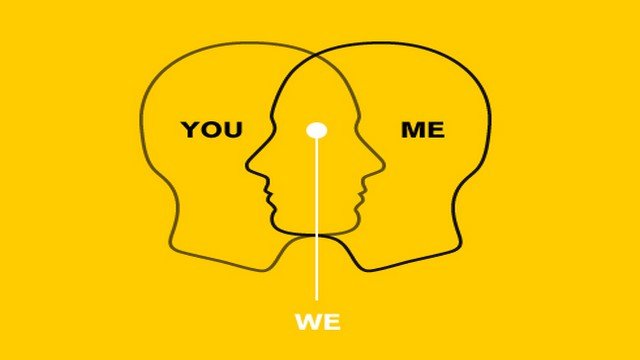Seeing Things From Their Perspective Isn't As Easy As It Sounds

Putting yourself in their shoes...
It might not be as easy as it sounds, when trying to identify with and understand the feelings of someone else. But having empathy for others around us is beneficial to society in multiple ways. It can help us to understand the needs of others, try to resolve conflict, and offer us a respect for the well-being of others--which includes a respect for their natural rights.
When we rely on our own intuition to try though and try to empathize with others however, it turns out that it might not lead us to the truth, or provide us with an accurate understanding of another person's perspective.

Recent psychological research that was published in the Journal of Personality and Psychology, suggests that when we try to put our self in another person's shoes, we are often using our own perspective rather than viewing the situation from their own. Our own worldview, experiences, and individual perspective, are obviously going to be much different from the other person, and researchers suggest that this egocentric bias that we hold, contributes to us making inaccurate predictions about other people and how they might feel or what choices they might make, how they might react to something, and more.
The strategy of trying to put our self in another person's shoes, to empathize with and understand their situation, might be a continually endorsed strategy, but it's one that might not be as effective as we think it is.
To investigate the effectiveness of either strategy, researchers conducted over 20 different experiments that involved strangers, spouses, couples, and friends.

Guess People's Emotions
In at least 15 of the experiments, participants were required to guess people's emotions, intentions, or thoughts; depending on what image they were shown on a picture or video.
The participants had to guess the emotions based on looking at the person's posture and facial expression etc. Some of the participants were given no instructions on what to do, others were told to think hard, and some were told to consult with their own feelings in order to assess what the emotion was they saw displayed on the image.
Turns out that for those who were relying on their own feelings, they provided the most inaccurate responses.

Make Predictions About Friends, Partners, And Strangers...
In another set of experiments, researchers had asked participants to make predictions about friends, partners, and strangers. The goal was to find out if those who had prior knowledge about the person, might make more accurate predictions and judgments about their possible reactions to videos, opinions, and so on. They guessed how much their partner or friend for example, might like a certain joke, activity, movie, or painting etc.
Researchers found that despite participants having that prior meaningful information about their friend or spouse for example, it didn't help them make any more accurate predictions in judging what another individual's perspective might be.
Telling ourselves or someone else to simply imagine our self in another person's shoes is not going to automatically increase our true ability to understand what they might be going through or what they might be thinking. And what we thought might be giving us closer insight into someone's life, might be doing the opposite in fueling an inefficiency of accuracy in our perspective overall.

Hope In Listening...
In the final portion of the study, researchers asked participants to imagine themselves in someone else's shoes, and to have a discussion with that person about their position on certain topics.
Researchers suggested that there might be a possibility for us to improve our perspective and the accuracy with which we try to gain insight into the life of someone else, and that is by talking to that person and getting their own perspective on things.
This is described as 'perspective-getting,' as opposed to 'perspective-taking'.
They saw that this was the case whether or not participants were spouses, friends, or strangers. If we really want to try and empathize with someone else and imagine what they might be going through, researchers assert that we should go to them and directly ask them for their perspective rather than play the guessing game. Quite often when we think that we are looking at things from their another person's frame of reference, we're mistaken in actually looking at it from our own.
Pics:
Pic 1
Pic 2
Pic 3
Pic 4
Pic 5

I never thought of how we could be convincing ourselves we are seeing something from there perspective when we are really just stuck in our own heads. IT would really take a pause and a bit of reflection to actually see it from their eyes once you even know that.
Interesting.
What would you do in their shoes? Exactly the same thing. Why? Because you would have lived their life up to that point, learned things they learned, be put in their position and reacted exactly as they had.
Awesome!
keep it up . I learnt a lot from this articule. ....👏👏👏
thanks for checking it out @ifesiokeagu
Empathy and still having the bias of "me", I guess, is a faux-empathy.
However, it's hard to really have the 100% sense of empathy. And it's also hard when we have no experience of the said feeling or circumstance. For me, my empathy would be, for other people's experience which I personally have never been into, is simply that I understand they're undergoing through a tough situation. And I understand their actions and reactions. I may not know what they are going through, but my empathy is the understanding that each individual has a unique personal individual singular experience of life.
Some interesting lessons to be learned here.
I remember a quote from a certain Dr. Manhattan that may fit in here quite well.
excellent post dear friend @doitvoluntarily if put in the place of the other one would have been easy the world would be much better, since there is something more difficult that to know the people and much less to put in their shoes, although there are many techniques none they assure are exact .
I wish you a great day dear friend
well articulated @doitvoluntarily
"If we really want to try and empathize with someone else and imagine what they might be going through, researchers assert that we should go to them and directly ask them for their perspective rather than play the guessing game."
So the best way to get to know what a person is thinking or feeling is to actually ask them instead of guessing and making stuff up? Whodda thunk it.